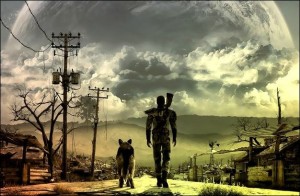The new release of the video game “Fallout4” presents us with a scenario in which mankind destroyed itself with nuclear war and few are  left alive. The landscape is one of devastation and decay. Its introduction consists of various views of the rubble with a somber voice saying, “War never changes, War never changes.” Its repetition is ominous and most sobering for a video “game.” However, how true! In Jeremiah’s day it was his repeated chant. The devastation to mankind as a result of war “never changes.” He reminds his own people, who in their arrogance refuse to repent and turn to God for salvation and guidance, look to Egypt and other earthly sources to protect them from the coming invasion from Babylon. But Jeremiah tells them it’s too late. In Jeremiah 6:4-5 he says, “Prepare war against her; arise, and let us attack at noon! Woe to us, for the day declines, for the shadows of evening lengthen! Arise, and let us attack by night and destroy her palaces!”
left alive. The landscape is one of devastation and decay. Its introduction consists of various views of the rubble with a somber voice saying, “War never changes, War never changes.” Its repetition is ominous and most sobering for a video “game.” However, how true! In Jeremiah’s day it was his repeated chant. The devastation to mankind as a result of war “never changes.” He reminds his own people, who in their arrogance refuse to repent and turn to God for salvation and guidance, look to Egypt and other earthly sources to protect them from the coming invasion from Babylon. But Jeremiah tells them it’s too late. In Jeremiah 6:4-5 he says, “Prepare war against her; arise, and let us attack at noon! Woe to us, for the day declines, for the shadows of evening lengthen! Arise, and let us attack by night and destroy her palaces!”
War never changes! It’s always devastating. The World War I patriot, Wilfred Owens, who died on the battlefield in France, recognized the necessity of war but denounced the glamorization of it. The great poet Horace was famous for the line “Dulce et decorum est pro patria mori.” It means how beautiful and becoming it is to give one’s life in war. Owens named one of his last poems after this Latin phrase. Here’s the concluding stanza: If in some smothering dreams you too could pace behind the wagon that we flung him in, and watch the white eyes writhing in his face, his hanging face, like a devil’s sick of sin; If you could hear, at every jolt, the blood come gargling from the froth-corrupted lungs, obscene as cancer, bitter as the cud of vile, incurable sores on innocent tongues,– My friend, you would not tell with such high zest To children ardent for some desperate glory, the old Lie: Dulce et decorum est Pro patria mori.”
I was watching the PBS special “Christmas through the Decades.” In the episode of the 60’s the life and works of John F. Kennedy were reviewed. As important as the moonshot was, it was acknowledged by most that his greatest contribution was the aversion of war in 1962 during the Cuban Missile Crisis. The western hemisphere faced an imminent danger of nuclear war as Cuba stockpiled nuclear weapons 90 miles off the coast of Florida. Kennedy averted that potential disaster by a show of force on the seas turned back the weapons. Noël Regney wrote a song in 1962 in response to the Cuban Missile crisis that Bing Crosby made famous. “Do you see what I see, do you hear what I hear…” You know it. But the haunting verse concludes, “pray for peace people everywhere….” Good exhortation for us all because war never changes. Let’s celebrate the coming of the Prince of Peace together!